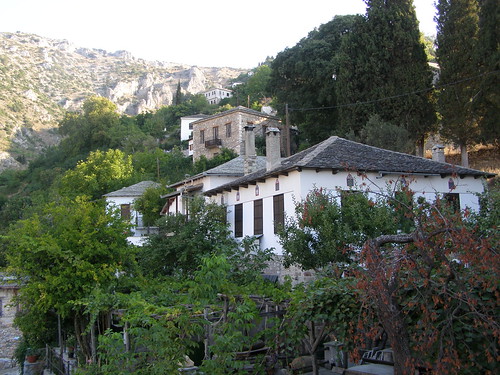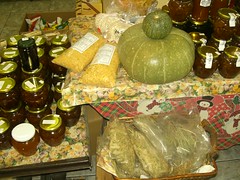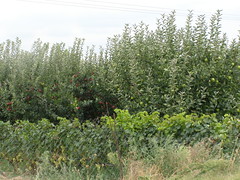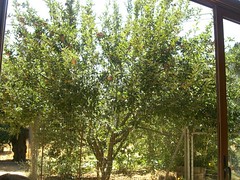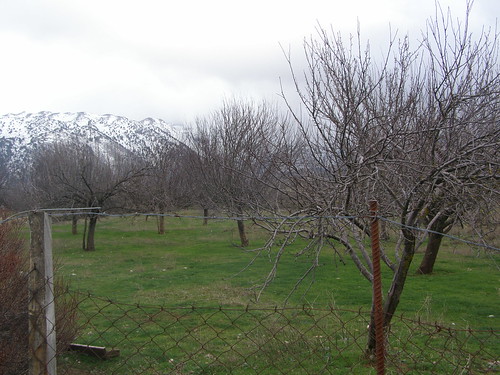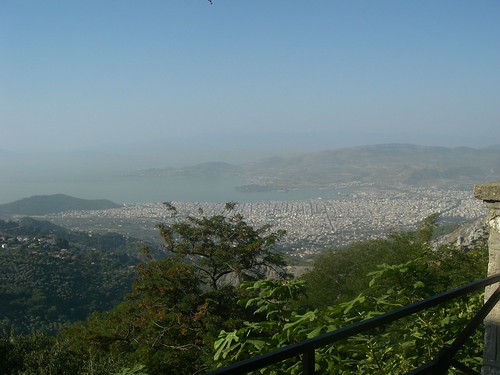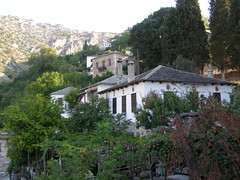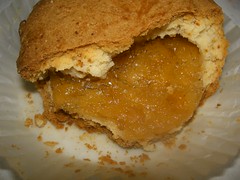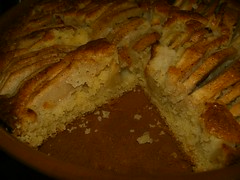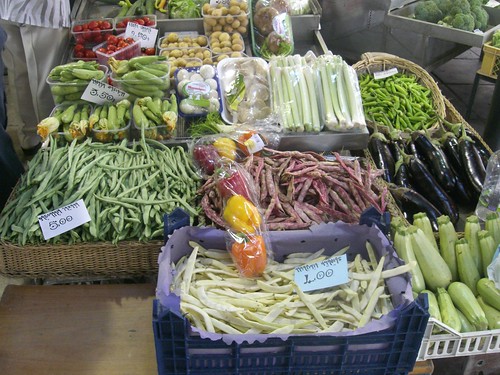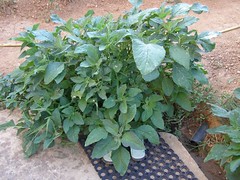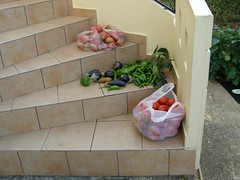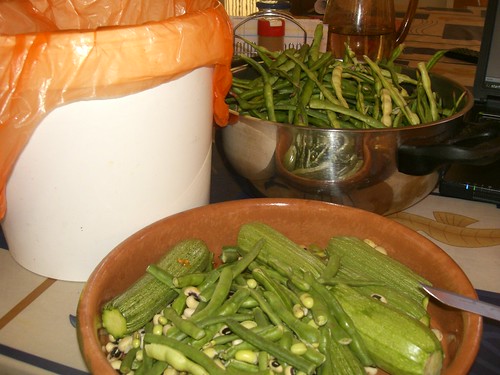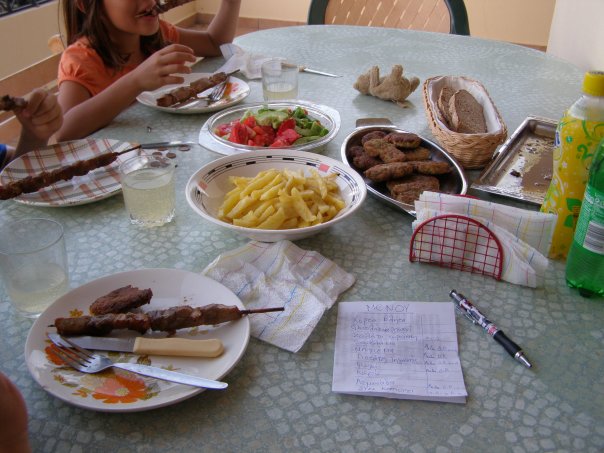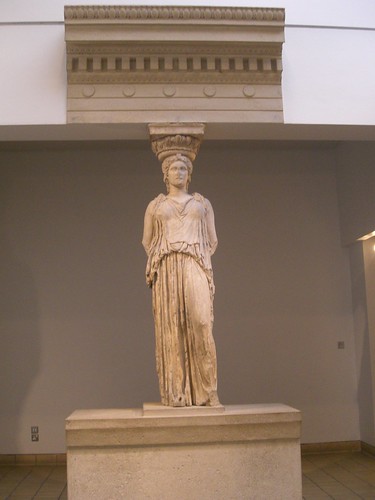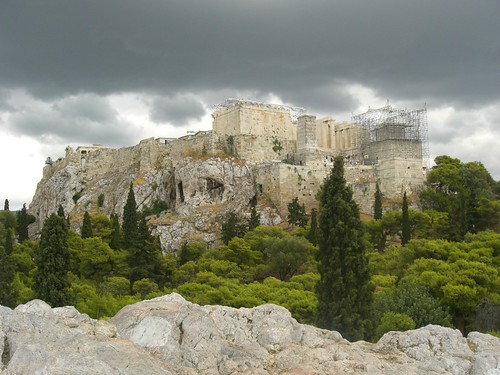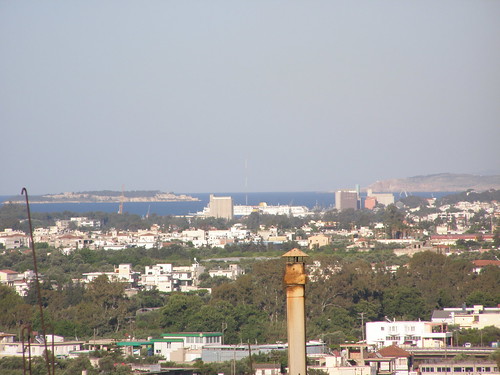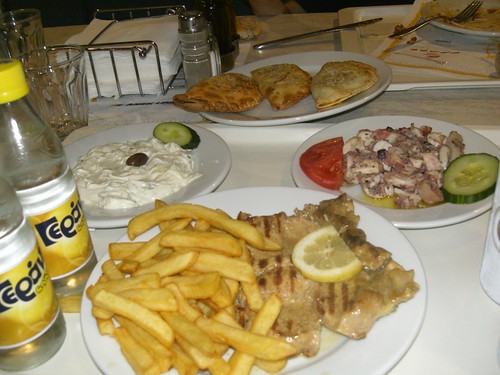My aunt had received a package from New Zealand which her daughter had sent her. It contained a separate parcel for me, a few bits and pieces that I might appreciate for old times' sake as an ex-pat Kiwi. My favorite presents are those from abroad because I know they will fill my mind with nostalgic memories of home, which doesn't really feel like home any more anyway.
I knew that there would be a packet of
pineapple lumps in it. They hadn't changed at all, they were just like I remembered them: little rectangles of chocolate-coated chewy pineapple-flavoured marshmallow. They taste better once they've been refrigerated for a little while, but since I was opening my parcel in company, I knew I'd have to open the packet of sweets now and offer everyone a piece, refrigerated or not.
"Chocolates?" my aunt exclaimed. "Athina has no idea how big your waistline's got, does she?" Thia is very honest; she doesn't even realise she's doing it. I explained to her that pineapple lumps are a New Zealand invention (like '
afghans' and '
pavlova'), and that everyone eats them there in the same way that Greek people love their 'pas-tes'.
"Do they grow pineapples in New Zealand?" asked Smaragda, my aunt's neighbour who always makes a beeline for Thia's house when she hears a stranger's voice talking with her on the verandah.
"No... I don't think so," I replied trying to avoid her, and turned away to look at the next item in the parcel.
"Oh," she answered, with a slightly confused sound to her voice. "I thought the climate was too cold for that." I
knew the climate was too cold for that.
There was a pair of green gloves in the packet. I figured that they weren't for keeping my hands warm in winter: the word 'veggies' was printed boldly on each one, "the latest craze in kitchen gadgets," my cousin had informed me, "to keep your hands clean when you peel potatoes." Did she not know
potato juice is quite astringent? A bit like lemon juice, so it actually keeps your hands clean as you peel them. I hoped that they would at least stop my fingertips from blackening when I was working with aubergines.
Pineapple lumps, veggie gloves and 'the thing'
But it was that last thing in the packet that stumped us all - a piece of orange plastic, in the shape of a square, with one thick rounded side that seemed to act as a handle, and another sharper finish with a 90-degree angle; what could it be, I wondered, is it some kind of knife?
"Idanafto to marafeti?" asked my aunt, looking at the piece of plastic.
"I dunno, Thia," I answered truthfully. I had no idea - it had caught me completely by surprise.
"Domou na to ido," Smaragda called out. I passed it to her and she picked it up in her wrinkled hand, turning it over and over, feeling the smooth edge with her fingers. Her eyebrows heightened with surprise as she touched the sharper edge.
"Ide mo-re, de to thiaksane kala!" she exclaimed, referring to its odd shape, where no side was alike; she thought it was badly made. She passed it back to my aunt.
"Ba, ola 'ne kala ekei da, giafto de fevgei o kosmos apo chi pera," my aunt corrected her. She loved the tangible comforts from the planet outside the borders of her own little world. Any place outside of Greece was 'Ameriki' to her, and it was always perfect. Her daughter had gone to New Zealand to marry someone she didn't know, upon the recommendation of my parents. She came back home once to visit her aging parents, but couldn't get used to the used toilet paper in the wastepaper baskets, the dirt roads and dusty houses, the swimming tomato chunks in salads that were overdressed with olive oil, all things she had grown up with for the first 23 years of her life before she left the place. She wanted to go back 'home', which she did as quickly as she could and has never come back since.
Her early letters enticed her brother to join her at the other end of the world. Periklis was not so taken to the
land of the long white cloud as his sister, which is how he found himself back in the village with us today. It was his turn to investigate the 'thing'. He picked it up and shoved it under my nose.
"Tosa grammata kates, kai de kates na mas epeis idanafto to prama?" he berated me, for not knowing what the thing was. I had been born in foreign parts and had lived there for so long, that it was somehow deemed 'wrong' not to know what a thing from
down under might be. He turned it over and over in his hands. "Pou'n' i Ioanna na mas epei ida'ne?" He was searching for his daughter, a Greek university student - she knew everything.
"Katidis gia tsi ginaiches thane," he contemplated. It probably was something ladies use, but that didn't help us to work out what exactly it was that women could do with the thing so that it couldn't be so useful for men.
"Katidis prepei na'ne, ma de kateme 'meis i amorfoti." Smaragda was lamenting about the general lack of intelligence among the parea that had congregated on Thia's verandah.
"Aaah, ide idane," offered my aunt. "Les nane ksistra gia ta podia?" She always made an effort to act worldly using her limited experiences and knowledge of the
antipodes (and the rest of the world for that matter), gained from her daughter's stories, through letters and phone calls, about her new homeland. The village also had a few newcomer brides who brought with them their modern hairdoes, high street fashion and make-up bags. I could just picture my Thia watching a young newly-married woman sitting on the balcony of one of the newly built villas rubbing a ladyshave up and down her legs or using a scraper to remove the dead skin off her heels; from the distance, it could look just like the thing.
Periklis had just returned from the chicken coop with a bucket of eggs.
"Ba," he muttered, without stopping to investigate further. "Pali ra-pes ap' to Niou Zoolan," he spat out, making his way to the kitchen. When he first arrived in New Zealand, his brother-in-law had found him a job at the local city council working as a 'ra-pes' collector. At first, Periklis thought he had hit the jackpot by landing a job in the 'dimosio', even if it meant that he would be collecting rubbish. He phoned his parents to let them know how well he was doing for himself in his new home. Slowly, he came to realise that state jobs were not as highly regarded in New Zealand as they were in Greece. He came back to the village after spending only two years at the end of the world, as he liked to refer to New Zealand, and had never gone back. His first insight to New Zealand was through the 'ra-pes' he collected off the streets and people's garbage bins, hence his final verdict that everything kiwi was 'ra-pes'.
By now, I was feeling my body sweat out of the embarassment of not being able to explain the non-growth of pineapple in a country which invented chocolate-covered pineapple sweets and the significance of this alien form of plastic. Smaragda picked up the marafeti and felt the sharper side with the fingers of her free hand.
"Kanei kalo masaz," she said, and everyone laughed, probably with the thought in their mind about who the massager might be in my case, and how he'd use the marafeti on my body.
"Haras to prama," said Thia, picking up the object of interest one more time. She was beginning to show signs of mental exhaustion after so much energy being spent on thinking about the possible uses for this unusual object.
Just then, Periklis' daughter bounded into the house. Joanna was a bright-eyed second-year Psychology student at the University of Rethimno. She always carried about her an urban whiff, despite her village upbringing; seeing her walk and talk would make one believe that unemployment was an unknown concept and life was perpetually readying itself to accept her into its routine after she graduated. Everything seemed within her reach and no one could stop her from attaining her dreams, which she wasn't quite clear of herself. She reminded me of myself at her age.
"Hello, Mary," she greeted me with an air of confidence. "Idanafto pou kratas, yiayia?" she asked her grandmother.
"De kateo, pedi mou," she answered. "Tha mas epeis esi pou ise epistimonas?"
Joanna picked up the thing in her hand and scrutinised it carefully. She turned it over front, back, up and down. She clearly had no idea what it could be. She looked at the barcode sticker which was still stuck on the thing.
"Pree-vee-ledz ider-na-si-o-nal," she read out. "We can check it up on the internet."
Why didn't I think of that first, I admonished myself. After so many years of living on the island, I had forgotten my city ways and taken to the rural culture that I was living among, despite having spent my university years being indoctrinated to believe in a progressive urban system which sought freedom, even though its aim was to control via jolting culture shocks, completely alienated from nature despite its strong organic movement,
a system which I had been subjected to and which all too often I served as a willing or unwitting instrument.
While I was musing on my previous life, Joanna had gone into her bedroom and googled the words written on the barcode sticker. She came back with a beaming look on her face.
"It's a kitchen gadget," she exclaimed proudly. "The company's American."
"Aaaaah," said her yiayia.
"But they make their products in China," explained Joanna. Another of those products designed in one place, but made somewhere else.
"Oooooh," said Smaragda.
"And Thia Lambrini left me a message on faze-buk," she continued.
"Eeehh?" The older generation gaped at her in awe.
"She said she sent you a pot scraper, Mary. Must be it, right?" A pot scraper? Indeed. It must have taken a super-brain to invent that one, a brain that was probably rewarded with a prize for combining the idea of how to use up the world's excess production of plastic in a marketable profit-making venture, with maybe a huge bonus included if the idea of recycling was incorporated into the blueprint.
"Ide pou perpata i technoloyia," said her yiayia. "Che de mou'steile che'mena ena?" Lambrini had put two scrapers in the present, presumably for me to use one and keep the other as a reserve, another example of the hoarding culture prevalent in societies where big houses on large sections of fenced-off land in straight rows with wide streets dominate the landscape. Could a village ever be built in thiese places? Only if the town planning rules were ignored...
"Here, Thia." I offered her one of the pot scrapers. "Take one."
"She must think you burn a lot of pans, Mary," Joanna remarked.
 This happened soon after I joined facebook nearly five months ago.
This happened soon after I joined facebook nearly five months ago.Little did she know.
PS: The characters in the story are all made up - I have no relationships of this sort.©All Rights Reserved/Organically cooked. No part of this blog may be reproduced and/or copied by any means without prior consent from Maria Verivaki.






